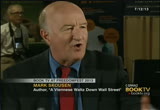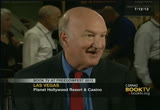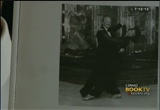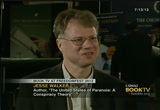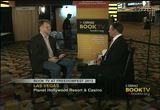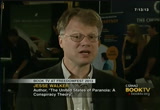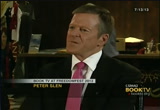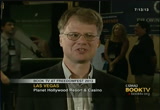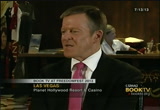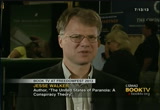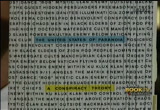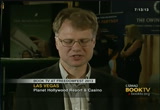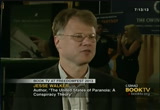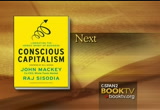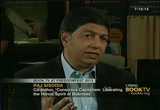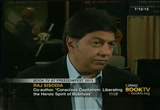tv Book TV CSPAN August 12, 2013 1:15am-1:31am EDT
1:15 am
people get excited. these are real people. it's not a random story like a drunken sailor walking down broadway. it's a dance. bulls and bears. buyers and sellers. it's speculators and investment. it's hedgers and speculators. there's an excitement on wall street my book is written for the intelligent investor who is interested in applying a new school of economic. not that familiar the u.s.a. began school and seeing if they can make them a little bit better investors. >> it's blurped on the back by lauren hayek. >> yes. >> who is that? >> an md was the son of i just found that quote, he put it on amazon or somewhere after
1:16 am
reading one of my books and said he's the only guy i can understand he speaks to the common man because lawrence was not an economy. he was the son of an economist. he was the m.d. he wasn't trained as an economist, and so my -- i did try to sin i live in the real world, i'm not just an academic. i have a ph.d. in economics. but because i am practical investment adviser as written a news letter for 34 years, people are interested. i think i have a writing style that is more understandable in the high ivory-tower type economist. >> there's a picture in the book bhap is it? >> my wife and i doing a waltz. on a cruise ship. i thought i'll dedicate it to the waltzing partner through life, my wife. >> the book dedicated is
1:17 am
vietnamese waltz down wall street. the founder of freedom fest and the author and many other book. this is booktv on c-span2. >> the united states of paranoia is the name of the book. here is the cover. published by harper. the author is jesse walker of reason. mr. walker, are americans a paranoid people? there has been paranoia at the heart of america for as long as -- i can't speak to the unreported history. i would assume there's paranoia then and certainly since the colonial days. america has been filled with conspiracy cultural paranoia. i don't know we're anymore more paranoid about any other country.
1:18 am
the book is about america. the french are very paranoid people too, for all i know. >> because you are paranoid doesn't mean you're not being followed or watched. >> right. >> is there some legitimacy to conspiracy theory? >> people conspire. that's part of life. it's one reason why we're always going have conspiracy theories. or fear of conspiracy is that there's going to be some conspiracy. it's not like fear of vampiring dying out when they figure out there aren't any vampire. i have a chapter about the investigation of the '70s after watergate and the revelation came out about the cia, fbi, irs, nsa a couple of initials have come up. there are real conspiracy. but when i'm also trying to do in the book is to look at conspiracy theories that say absolutely nothing true about the object of the series but all sort of thing that are true
1:19 am
about the anxiety and the experience of the people who accept and believe and pass on the theory. the story doesn't catch on unless people feel a reason to believe it. >> what is a contemporary example. >> i think all sort of theories involve, you know, flooding again american liberty and sovereignty are going naturally appeal to people who feel like they're losing control over their live. all sort of new world order theory, for example, are metaphoric way of speaking about the losses controlled to people even the loss control is not being directed by 13 people in a secret room somewhere. this tbrun couple of decades ago. the idea that why doctors were injecting black -- there's no truth to that. ther responsible to say it was true. but it was able to catch on many had abusive treatment at the
1:20 am
hands of hie doctor. also, one other thing i stress in the book is that powerful people have e conspiracy theories as well. it's not just a future of it. it's been a part of the american political center in the left and the right. they have example of people who are in charge of society and very much afraid of the people they -- slave owners, for example, some two slaves talking to one another. what about the contemporary 9/11 conspiracy theory building seven, et. cetera, do you look at that in the united of paranoia? >> i discuss it briefly.
1:21 am
i cite a couple of discussions. there's a lot of talk about the it and, you know, they are interesting. they are also in a way the side show. the paranoia that gripped network -- america after 9/11 somebody could spill coffee creamer and see it and think it was anthrax. everybody got seized by that. maybe we went a little bit over the top. maybe when we saw something at the mailbox in east texas and turned out to be someone's science project we thought it was a bomb. we scrolled, you know, actually after the world trade center and the pentagon maybe some neighborhood in texas was not going the target. and even if you are saying, you know, there's better safe than sorry. maybe the police did not -- to take after they figured out it was a school project. that's the kind of paranoia i
1:22 am
like to spend time discussing in the book. it's easy to say look it's the great people. who believe in conspiracy theory. there are crazy folks in the book. but all sorts of every day people, people that watch c-span, people that, you know, can get seized by it at different time. we later realize that it was a little bit over the top. >> with the revelation about the nsa, the irs, in your view, should we be paranoid? >> i never want encourage to be paranoid. it's good to be scect -- i'm for good solid investigative journalism. >> what is one of your favorite conspiracists or leaders from our history? >> from our history.
1:23 am
well, some of the interesting things in the book are from people that you wouldn't expect. john quincy adams was very much afraid of the i influence in the united. the important thing isn't whether or not jackson or clay wins the election. i don't remember the exact phrase the encroaching power of free masonry. there are people you are surprised to hear of them discussing it. it's a less familiar figure, i wouldn't call him a -- there was a guy named john todd in the '70s was on the circuit on churches say he was a member of the high priests. and tell these very elaborate conspiracy stories that brought in everything from the rockefeller to denny's. literally decoding the alleged
1:24 am
meanings of the sign meant it's not just a colorful story. but what he was saying in the '70s entered the mainstream in the '80s with the sexual appeals stannic -- people went jail and 2020. >> president andrew jackson became part of a conspiracy theory. >> yeah. i open the book he survives and sass nation attempt. richard lawrence tried to shoot him and the gun didn't fire. after wards he became convinced that a senator hired the
1:25 am
asassen. and at the same time people who were antijackson were suggesting maybe it was a false flag attack. maybe jackson arranged for him to attack him for sympathy. that's why the gun didn't fire. nothing was ever move -- proved. when jfk was assassinated what happened in the country with regard to paranoia? >> there's -- people were already paranoid about a number of things and opened up the flood gate. there was a fear, for example, of the radical right that had been building, and because this was there belief that lee harvey
1:26 am
oswald was a man of the far right. he turned out to be a communist. there was that sort of exacerbated that fear. and other people sort of because his left-wing qek plugged to the cold war. this is before getting the to assassination theory come up. when the president is assassinated people naturally get fearful. i where more about conspiracy theory and urban right than assassination in the context of the '60s. these things piled one on top of another. >> what is your day job? >> the book editor of "reason magazine" i'm signing book review. i'm writing for the magazine, doing other editing for the magazine and occasionally freelancing. >> what are some of the upcoming book tights this fall in.
1:27 am
>> i make a club for a feature we came out with. we had the 45th anniversary issue. and we asked the number of people historians, economists, legal scholar to pick in the one or duobest book in your field that come out in the last 45 years. we have, i think, a total of nine books picked. i think it's an interesting feature. >> where can people find? >> reason.com. we are also at all the better newsstands. >> and the united states paranoia is your second book. conspiracy theory. jesse walker is the author. and here again is the cover. "conscious capitalism" the force of business in capitalism can be combined to create value for shareholders, workers, customers, and society at large. he profiled companies that have
1:28 am
successfully done this. booktv interviewed him at freedom fest. a libertarian conference held annually in las vegas. you watch this twenty-minute interview now. >> "conscious capitalism." professor, what is "conscious capitalism ?" >> a way of thinking about business. we have -- narrow narrative and definition what it is about and the purpose of it. that's something they great created. taking a business in a realist way that successful -- [inaudible] built on a -- [inaudible] something they are trying to do in the world which is wort doing. which created value in a certain
1:29 am
way which is meaningful to people. not only to customers but employees and comiew it and suppliers at large. not just in term of shareholders and treating them as a mean but actually think about all of their stakeholders as -- [inaudible] not just trying to -- but [inaudible] including the environment which is trying to be valuable and do it in a way that doesn't require trade-off. that you can actually simultaneously enhan without being a stakeholder. if you think about it creatively. if you think about it in a traditional way you end up with a lot of trade-off. the third is the leader of the company and the conscious leaders.
1:30 am
they are actually motivated first and foremost by the organization and service to all of the stakeholders. nay are much less driven by -- [inaudible] the last is they tend to have a you teak culture. a culture of awe thennistty and love and care. they are built on love and -- [inaudible] that seem like the fuel to get people what they need to work [inaudible] they realize it's not about that. it's not when you get human beings acting to their highest potential. when they are driven bay sense of purpose and meaning. so the
74 Views
IN COLLECTIONS
CSPAN2 Television Archive
Television Archive  Television Archive News Search Service
Television Archive News Search Service 
Uploaded by TV Archive on

 Live Music Archive
Live Music Archive Librivox Free Audio
Librivox Free Audio Metropolitan Museum
Metropolitan Museum Cleveland Museum of Art
Cleveland Museum of Art Internet Arcade
Internet Arcade Console Living Room
Console Living Room Books to Borrow
Books to Borrow Open Library
Open Library TV News
TV News Understanding 9/11
Understanding 9/11